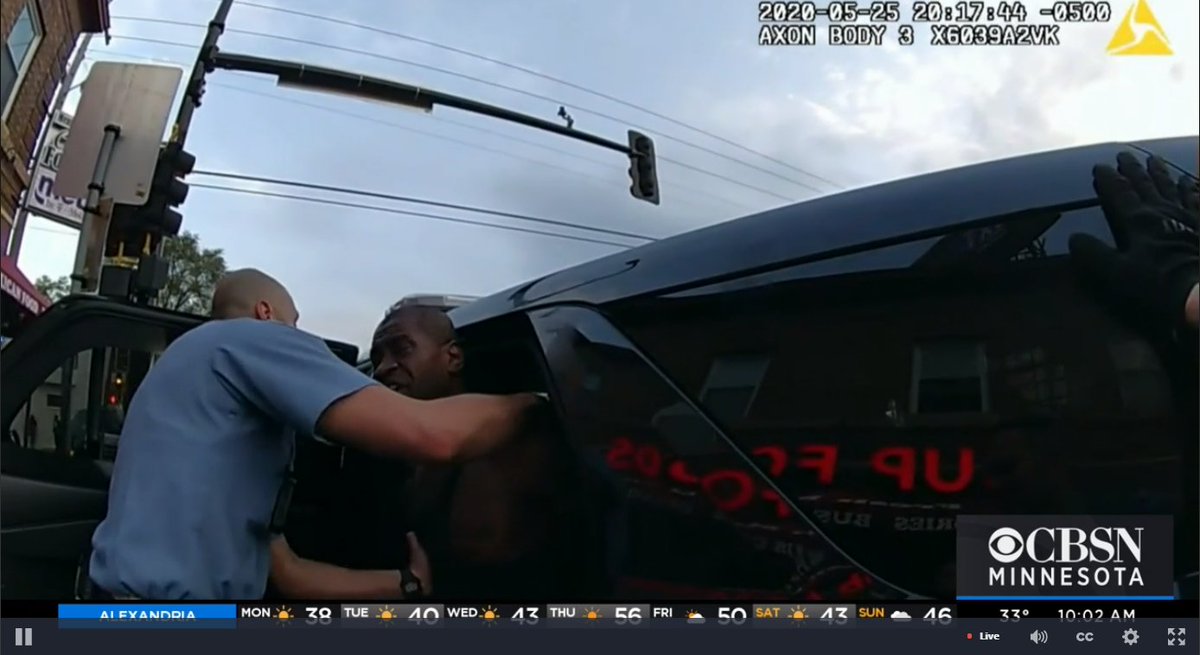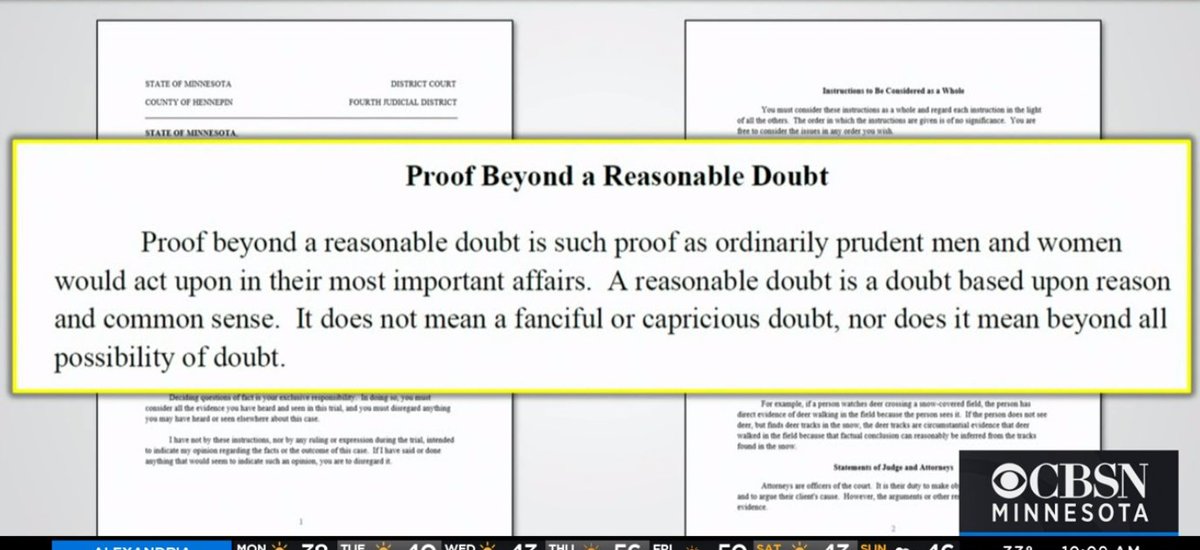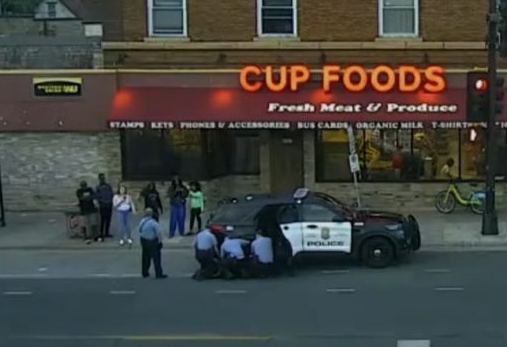
After 14 days of testimony, closing arguments are about to be made in the #DerekChauvinTrial.
WATCH LIVE: cbsloc.al/32FEJCJ
LATEST UPDATES: cbsloc.al/3x4aMtQ
WATCH LIVE: cbsloc.al/32FEJCJ
LATEST UPDATES: cbsloc.al/3x4aMtQ

Prosecutor Steve Schleicher is expected to deliver the closing argument on behalf of the state.
After that, Eric Nelson, the attorney for Derek Chauvin, will make his closing argument.
Each statement is expected to last about an hour.
After that, Eric Nelson, the attorney for Derek Chauvin, will make his closing argument.
Each statement is expected to last about an hour.
After the defense's presentation, the state is expected to give a rebuttal.
Court is now underway.
Judge Peter Cahill is giving the jury instructions.
WATCH LIVE: cbsloc.al/32FEJCJ
Judge Peter Cahill is giving the jury instructions.
WATCH LIVE: cbsloc.al/32FEJCJ

Judge Cahill:
"The fact that other causes contribute to the death does not relieve the defendant of criminal liability.
However, the defendant is not criminally liable if a superseding cause caused the death."
WATCH LIVE: cbsloc.al/32FEJCJ
"The fact that other causes contribute to the death does not relieve the defendant of criminal liability.
However, the defendant is not criminally liable if a superseding cause caused the death."
WATCH LIVE: cbsloc.al/32FEJCJ
Now, Judge Cahill is walking the jurors through each of the charges.
Derek Chauvin is charged with second-degree unintentional murder, third-degree murder and second-degree manslaughter.
Derek Chauvin is charged with second-degree unintentional murder, third-degree murder and second-degree manslaughter.
For each of the charges, all of the elements involved must be proved beyond a reasonable doubt for Chauvin to be convicted, Judge Cahill tells the jury.
WATCH LIVE: cbsloc.al/32FEJCJ
WATCH LIVE: cbsloc.al/32FEJCJ
Closing arguments are now starting in the #DerekChauvinTrial.
Up first is prosecutor Steve Schleicher.
WATCH LIVE: cbsloc.al/32FEJCJ
Up first is prosecutor Steve Schleicher.
WATCH LIVE: cbsloc.al/32FEJCJ

Schleicher: "On May 25, 2020, #GeorgeFloyd died face down on the pavement, right on 38th and Chicago in Minneapolis.
"Nine minutes and 29 seconds, nine minutes and 29 seconds. During this time George Floyd struggled, desperate to breathe."
"Nine minutes and 29 seconds, nine minutes and 29 seconds. During this time George Floyd struggled, desperate to breathe."
"So desperate to breathe, he pushed with his face -- with his face! -- to lift himself, to open his chest, to give his lungs room to breathe."
WATCH LIVE: cbsloc.al/32FEJCJ
#DerekChauvinTrail
WATCH LIVE: cbsloc.al/32FEJCJ
#DerekChauvinTrail
"George Floyd's final words on May 25, 2020, were 'Please, I can't breathe.'"
Schleicher says that Floyd called Derek Chauvin "Mr. Officer."
Floyd asked Mr. Officer for help, Schleicher said, but Derek Chauvin did not help.
WATCH LIVE: cbsloc.al/32FEJCJ
Schleicher says that Floyd called Derek Chauvin "Mr. Officer."
Floyd asked Mr. Officer for help, Schleicher said, but Derek Chauvin did not help.
WATCH LIVE: cbsloc.al/32FEJCJ
"When he was unable to speak, the defendant continued, when he was unable to breathe, he continued...this assault for 9 minutes and 29 seconds," Schleicher said.
"The defendant had to know what was right beneath him. You saw the video...he was completely limp."
"The defendant had to know what was right beneath him. You saw the video...he was completely limp."
"The defendant was on top of him for 9 minutes and 29 seconds, and he had to know...he had to know."
"What he did to #GeorgeFloyd killed him." #DerekChauvinTrail
WATCH LIVE: cbsloc.al/32FEJCJ
"What he did to #GeorgeFloyd killed him." #DerekChauvinTrail
WATCH LIVE: cbsloc.al/32FEJCJ

"Our expectation is that the police are going to help...To be clear, this case is called the State of Minnesota vs. Derek Chauvin, not the State of Minnesota vs. police... Policing in a noble profession."
#DerekChauvinTrail
WATCH LIVE: cbsloc.al/32FEJCJ
#DerekChauvinTrail
WATCH LIVE: cbsloc.al/32FEJCJ
"The defendant was a police officer, he was...He's not on trial for who he was, but for what he did."
Schleicher says that Derek Chauvin did not follow his police training and violated use-of-force and de-escalation policies.
Schleicher says that Derek Chauvin did not follow his police training and violated use-of-force and de-escalation policies.
"What the defendant did here was a straight-up felony assault...and he did it on purpose, no question...He killed #GeorgeFloyd."
WATCH LIVE: cbsloc.al/32FEJCJ
WATCH LIVE: cbsloc.al/32FEJCJ
Speaking on Derek Chauvin's body language, Schleicher says that he was "not going to be told what to do...the bystanders were powerless. The defendant, he chose pride over policing."
"#GeorgeFloyd is not on trial...he didn't get a trial when he was alive."
WATCH LIVE: cbsloc.al/32FEJCJ
WATCH LIVE: cbsloc.al/32FEJCJ

"How does Mr. Floyd look in this photo? Terrified?"
Schleicher notes how Floyd followed Officer Lane's instructions.
"They ask him to sit down, he sits down. That's compliance...Where's the resistance?"
WATCH LIVE: cbsloc.al/32FEJCJ
Schleicher notes how Floyd followed Officer Lane's instructions.
"They ask him to sit down, he sits down. That's compliance...Where's the resistance?"
WATCH LIVE: cbsloc.al/32FEJCJ

Schleicher says that #GeorgeFloyd saw the back of the squad car and must have thought it seemed like a "cage" and "couldn't bring himself to get in.
He notes that police are trained to deal with this. "Officers wouldn't listen to him, or look at the signs."
He notes that police are trained to deal with this. "Officers wouldn't listen to him, or look at the signs."

Prosecutors show body-worn camera footage of #GeorgeFloyd's arrest.
Schleicher says that Floyd looked like he saw a monster when he saw the back of the squad car.
When officers pulled Floyd out of the car, he thanked the officers, Schleicher notes.
Schleicher says that Floyd looked like he saw a monster when he saw the back of the squad car.
When officers pulled Floyd out of the car, he thanked the officers, Schleicher notes.

"They pushed him down to the ground...for what?"
Schleicher says that when #GeorgeFloyd was first taken out of the car, he was in the recovery position. But then officers put him in the prone position, which is known to carry the risk of positional asphyxia.
Schleicher says that when #GeorgeFloyd was first taken out of the car, he was in the recovery position. But then officers put him in the prone position, which is known to carry the risk of positional asphyxia.
"Use your common sense. Believe your eyes. What you saw, you saw."
Schleicher is now talking to the jury about the law and "proof beyond a reasonable doubt."
WATCH LIVE: cbsloc.al/32FEJCJ
Schleicher is now talking to the jury about the law and "proof beyond a reasonable doubt."
WATCH LIVE: cbsloc.al/32FEJCJ

Schleicher tells the jury they're not required to believe witness testimony that "flies in the face of common sense."
"You're not required to believe...that at that moment he died of heart disease, or a drug overdose. That's nonsense. Believe your eyes."
#DerekChauvinTrail
"You're not required to believe...that at that moment he died of heart disease, or a drug overdose. That's nonsense. Believe your eyes."
#DerekChauvinTrail
Schleicher is now going over the particular elements of the charges against Derek Chauvin.
WATCH LIVE: cbsloc.al/32FEJCJ
WATCH LIVE: cbsloc.al/32FEJCJ

Schleicher says that the fact that other causes may have contributed to #GeorgeFloyd's death does not relieve Derek Chauvin of criminal liability.
“Believe your eyes. With unreasonable force pinning him to the ground. That’s what killed him. This was a homicide.”
“Believe your eyes. With unreasonable force pinning him to the ground. That’s what killed him. This was a homicide.”
Schleicher is going over the medical testimony. He says that the experts showed that #GeorgeFloyd died due to lack of oxygen, not a cardiac event.
"It was like he was in a vice, squeezed in a vice."
WATCH LIVE: cbsloc.al/32FEJCJ
"It was like he was in a vice, squeezed in a vice."
WATCH LIVE: cbsloc.al/32FEJCJ

Schleicher is now addressing the drugs found in #GeorgeFloyd's system.
"This looked nothing like a fatal fentanyl overdose...He did not die of a drug overdose."
WATCH LIVE: cbsloc.al/32FEJCJ
"This looked nothing like a fatal fentanyl overdose...He did not die of a drug overdose."
WATCH LIVE: cbsloc.al/32FEJCJ

"There were multiple moments in time where things could have gone different and #GeorgeFloyd would have lived."
Schleicher says that if officers just performed CPR or rolled Floyd onto his side, in accordance with their training, Floyd would not have died.
Schleicher says that if officers just performed CPR or rolled Floyd onto his side, in accordance with their training, Floyd would not have died.
Schleicher is now going over the assault element in the second-degree murder charge.
"We don't have to show that the defendant intended to kill him, the only thing we have to show is that he assaulted #GeorgeFloyd on purpose."
WATCH LIVE: cbsloc.al/32FEJCJ
"We don't have to show that the defendant intended to kill him, the only thing we have to show is that he assaulted #GeorgeFloyd on purpose."
WATCH LIVE: cbsloc.al/32FEJCJ

Schleicher turns to the third-degree murder charge, says it must be an act "imminently dangerous" performed without regard to human life.
Like the second-degree murder charge, the state does not need to prove that Chauvin intended to kill #GeorgeFloyd.
Like the second-degree murder charge, the state does not need to prove that Chauvin intended to kill #GeorgeFloyd.
"Do you want to know what indifference is and sounds like?"
Schleicher plays body-worn camera video of #GeorgeFloyd pleading for air, saying he's in pain as officers continue to pin him down.
WATCH LIVE: cbsloc.al/32FEJCJ
Schleicher plays body-worn camera video of #GeorgeFloyd pleading for air, saying he's in pain as officers continue to pin him down.
WATCH LIVE: cbsloc.al/32FEJCJ

Schleicher is now going over the elements of the second-degree manslaughter charge.
"He had the training...he knew what to do, he just didn't do it. He knew better, he just didn't do better."
WATCH LIVE: cbsloc.al/32FEJCJ
"He had the training...he knew what to do, he just didn't do it. He knew better, he just didn't do better."
WATCH LIVE: cbsloc.al/32FEJCJ

Schleicher considers if Chauvin's actions as a police officer were objectively reasonable.
"He did not act as a reasonable officer would...Force is not authorized against someone merely when they are 'on something.'"
WATCH LIVE: cbsloc.al/32FEJCJ
"He did not act as a reasonable officer would...Force is not authorized against someone merely when they are 'on something.'"
WATCH LIVE: cbsloc.al/32FEJCJ

"George Floyd was not a threat, he never was. He wasn't resisting, he just wasn't able to comply...But the defendant stayed on top of him, grinding his knee into him...not a reasonable use of force."
Schleicher notes that Chauvin didn't follow MPD policy.
Schleicher notes that Chauvin didn't follow MPD policy.
"Force must be reasonable at the time it starts, by the time it ends, and at all points in between."
#DerekChauvinTrial
WATCH LIVE: cbsloc.al/32FEJCJ
#DerekChauvinTrial
WATCH LIVE: cbsloc.al/32FEJCJ
Schleicher highlights how many police officers took the stand and said that Chauvin's use-of-force was unreasonable, "totally unnecessary."
WATCH LIVE: cbsloc.al/32FEJCJ
WATCH LIVE: cbsloc.al/32FEJCJ

Speaking to any "skeptics" on the jury, Schleicher says: "How can you justify the continued use of force on this man when he has no pulse?"
WATCH LIVE: cbsloc.al/32FEJCJ
WATCH LIVE: cbsloc.al/32FEJCJ

Schleicher turns to the bystanders. Says they were random members of the community, chosen by fate and powerless to stop what happened.
"All they could do was watch, gather their thoughts and memories, gather those precious recordings...and they bore witness to what they saw."
"All they could do was watch, gather their thoughts and memories, gather those precious recordings...and they bore witness to what they saw."

Schleicher again tells the jury that they can "believe their own eyes."
He tells the jurors that only they have the power to convict Derek Chauvin.
"This wasn't policing. This was murder. The defendant is guilty of all three counts. And there's no excuse."
He tells the jurors that only they have the power to convict Derek Chauvin.
"This wasn't policing. This was murder. The defendant is guilty of all three counts. And there's no excuse."
That ends the prosecution's closing arguments.
Now the court is taking a 20-minute break before the defense gives its closing argument.
Now the court is taking a 20-minute break before the defense gives its closing argument.
• • •
Missing some Tweet in this thread? You can try to
force a refresh










